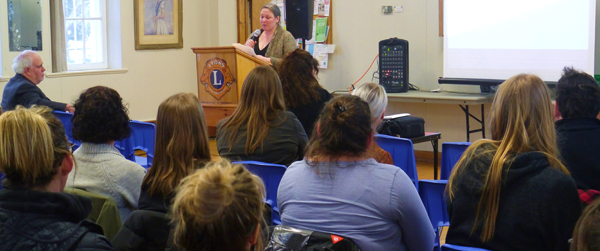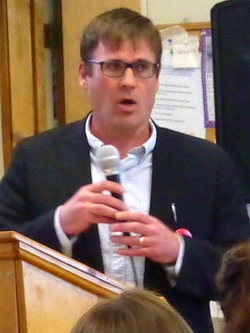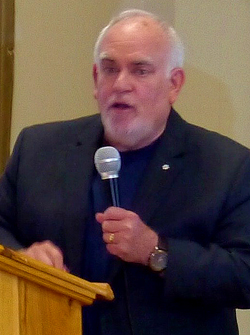Community seeks answers on changes to education system
Administrator | Apr 30, 2019 | Comments 0

Alison Kelly, parent, and school board trustee for South Prince Edward, told the community that in times of change and uncertainty, people must continue to work together and to advocate for public education.
Story and photos by Sharon Harrison
Students, families and the community gathered Monday night in Wellington to learn about the future of education in Prince Edward County.
The meeting was the second in the County held to hear what proposed education cuts made by the provincial government will mean for students and teachers. The first was held April 4 at the Picton Town Hall, following a public protest by students downtown, as part of a province-wide #StudentsSayNo event.
Changes proposed include increased class sizes for intermediate and secondary grades, as well as new math and sex-ed curricula, mandatory e-learning modules. Reforms will also increase class sizes and cut elective programs, including the arts, and will lead to cuts in teaching positions and OSAP funding.
It was standing-room-only at Wellington’s Town Hall as about 120 people were welcomed by the evening’s chairperson, Marian Moon, an Ontario Secondary School Teachers’ Federation (OSSTF) District 29 Hastings-Prince Edward executive officer, and teacher at Prince Edward Collegiate Institute (PECI) for the past 28 years.
Alison Kelly, parent, and school board trustee for South Prince Edward, told the community that in times of change and uncertainty, people must continue to work together and to advocate for public education.
“Living in a community with high rates of poverty, teen pregnancy and mental health issues, I’m worried that potential changes in policy and government funding may further oppress those in our community who need the most support.”
Grade 10 PECI student Talia Epstein, a co-organizer of the student protest, said students want to know how they will be impacted and what they can do to help.
“I’ve noticed that the kids are quick to do their own research and come to their own conclusions,” said Epstein. “It’s actually very admirable how much the student body at PECI cares about their futures.”
Epstein spoke to the connection between student and teacher, as well as access to resources, that make the education experience a good one.
It’s a human thing, she said. “All of the teachers and staff at PECI are incredibly valuable people, dedicated to helping each student succeed on an individual basis. The cuts would make that individual connection so much harder to achieve. There would be little or no motivation to go to school to sit in front of a computer or in exponentially larger classes.”
She said many students will struggle to succeed with mandatory e-learning programs, others do not own a computer, or have a reliable internet connection at home. Most schools, she added, do not have enough computers for those in need.

OSSTF President Scott Marshall
Local 29 OSSTF president Scott Marshall expressed need for town hall meetings “because the government is not being truthful with citizens about the changes planned for education.”
Cuts announced by the Minister of Education on March 15 did not come with technical information, he said, so he was working with information available as he began with a change in the formula that generates the number of teachers in the high school.
“This is going to change the number of teachers given the same number of students. Right now, every 22 students in the classroom will generate one teacher; the change would be every 28 students would generate one teacher.”
Other proposed changes, he said, will reduce funding for grants for students’ needs and school operations funding, which will reduce support staff.
According to the Hasting Prince Edward District School Board (HPEDSB), high school enrolment as of Sept. 17, 2018 was 4,578. And while enrolment for next year is projected to naturally decrease by about 100 students, Marshall said “that wouldn’t generate anything like the reductions we are going to see.”
HPEDSB, he said, is a small school board, with 330 full-time teaching positions as of fall 2018.
“Four years from now, with the government’s changes, there would be a reduction of about 60 full-time teaching positions,” and a centralized e-learning system, he suggested, could remove an additional 20 teaching positions from the seven local secondary schools.
“When those teachers disappear, so do the classes. There are a lot of reasons for concern here,” he said, adding that while the system is never perfect, it is not broken.
“Ontario students are performing well. In 2016, the five-year graduation rate increased to 86.5 per cent, up 18 percentage points.”
He went on to add proposed changes will mean the cancellation of many small programs currently offered; fewer supports for at-risk students and fewer extra-curricular activities. Student safety, with fewer adults in the building, is also a concern.

Dr. Charles Pascal
“Right now, we are witnessing a war between facts and fiction, a war between evidence and ideology,” said guest speaker, Dr. Charles Pascal, an internationally recognized Canadian educator.
“The Minister has claimed that the consultation for educational changes in Ontario is the largest in the history of the province,” he said. “That this has been the deepest and broadest consultation in the history of education in Ontario is an unmitigated fabrication.”
“There will be a loss of significant opportunities for courses that are enriching, that are part of the fabric of a life-long learner and start with full-day kindergarten.”
Parents need the choice to have a high-quality early learning environment, not a voucher or tax relief.”
“It’s important that we not just talk about what’s going on in the classrooms,” said Pascal. “Pre-school, through primary and elementary, through high school and post-secondary within the training system. We have to look at the context in which our children and our youth and our young adults are living. We have to look what is going on outside education policy to understand the deleterious effects of what’s going on with our kids and our young adults because they live in these communities.
“The evidence will win out, the truth will win out and the people of Ontario will respond.”
Pearl Hucal began the question and answer segment by saying she was trying to figure out the end game.
A Picton resident stated people outside the room, and parents at PECI don’t know what’s happening while others are saying, ‘why bother and why should they come out?’
“This is not about politics. This is about my kids,” he said. “What do people want to do about it? We need to put pressure on politicians and it starts locally. I’m here because I think we can turn this around.”
Several audience members spoke to e-learning, with one saying it was not working, another said “it sucked”, while a further stated it was not individual learning.
“We need to remember that students and staff at Ontario schools are not a budget or a statistic.” added Epstein. “There are hundreds of thousands of individuals with individual dreams and individual needs that need to be met and need the funding necessary to excel.”
She said students here and all over Ontario are ready and willing to stand up for themselves and fight for their friends, family and teachers. “Education is not a cost; it is an investment,” she said.
“We need to listen to the students; get out of the way and let the students lead,” concluded Pascal.
Another Putting Students First town Hall meeting is being held in Trenton April 30 at 7 p.m. at the Curling Club. Belleville’s was held earlier this week.
Filed Under: Local News
About the Author:
































